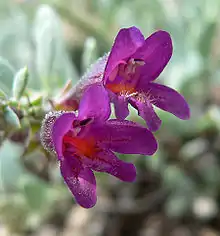Penstemon thompsoniae
Penstemon thompsoniae, Thompson's beardtongue, is a low perennial plant endemic to the southwestern United States, where it grows in dry shrublands, woodlands and forests. It is considered a species of conservation concern in California.
| Penstemon thompsoniae | |
|---|---|
 | |
| Penstemon thompsoniae ssp. jaegeri (sensu Keck) | |
| Scientific classification | |
| Kingdom: | Plantae |
| Clade: | Tracheophytes |
| Clade: | Angiosperms |
| Clade: | Eudicots |
| Clade: | Asterids |
| Order: | Lamiales |
| Family: | Plantaginaceae |
| Genus: | Penstemon |
| Species: | P. thompsoniae |
| Binomial name | |
| Penstemon thompsoniae | |
Taxonomy
Penstemon thompsoniae originally was considered a variety of Penstemon pumilis, as published by Asa Gray in 1878.[1] It was later reclassified as Penstemon caespitosus var. thompsoniae by Aven Nelson, and then elevated to full species by Per Axel Rydberg.[2]
In 1937, David D. Keck recognized two subspecies of Penstemon thompsoniae: ssp. jaegeri, restricted to mountains of Clark County, Nevada, which he distinguished by its few, remote stems and open inflorescence, and ssp. thompsoniae in Arizona, Nevada, and Utah, which he distinguished by its tufted stems and compact inflorescences. These subspecies are no longer recognized due to the morphologic continuum that exists between them.[3]
Description
Penstemon thompsoniae is a mat-forming perennial herb or subshrub, less than 15 cm high, with a woody base. It is ashy gray-green with a thick coating of hairs. The leaves are oval or spoon-shaped, to 2 cm long. The short inflorescence bears wide-mouthed tubular purple flowers to 2 cm long, glandular hairy on the outer surface, and somewhat hairy on the inner. The tip of the staminode is covered in yellow to orange hairs.[3]
Distribution
Penstemon thompsoniae is endemic to the southwestern United States, occurring in Nevada, southwest Utah, Arizona and southeastern California.[4] Habitat includes sandy to gravelly soils, sagebrush shrublands, pine-juniper woodlands and pine forests, at 1500-3400 m elevation. It typically blooms May–Aug.[3]
The limited range of Penstemon thompsoniae in California has made it of state conservation concern.[5]
History
Penstemon thompsoniae was first collected by Ellen Powell Thompson in 1872 in the vicinity of Kanab, Utah, during the US Topographical and Geological Survey of the Colorado River (led by John Wesley Powell). Her specimen, the holotype, is deposited at the Gray Herbarium.[6]
References
- Gray, A.1878. Synoptical flora of North America. Vol. II - Part 1. New York: Ivison, Blakeman, Taylor and Co. (see page 269). Available through the Biodiversity Heritage Library
- Welsh, SL. 1982. Utah plant types—historical perspective 1840 to 1981—annotated list, and bibliography. Great Basin Naturalist 42:129-189 (see page 179). Available through the Biodiversity Heritage Library
- Penstemon thompsoniae in Flora of North America
- Penstemon thompsoniae in USDA Plants Database
- Calflora
- Penstemon thompsoniae holotype, Gray Herbarium